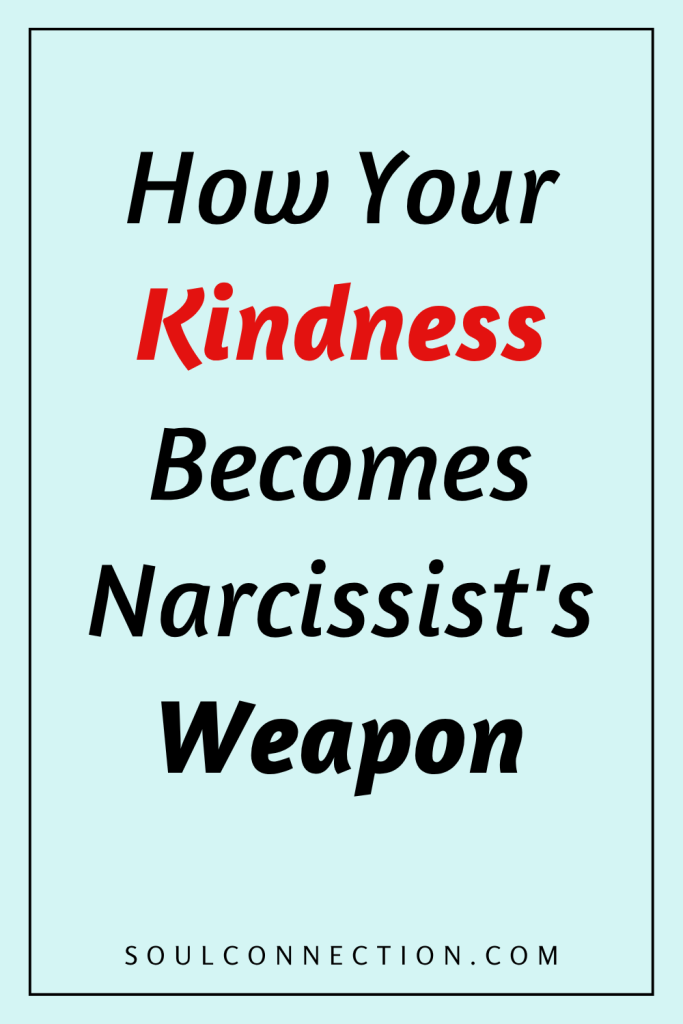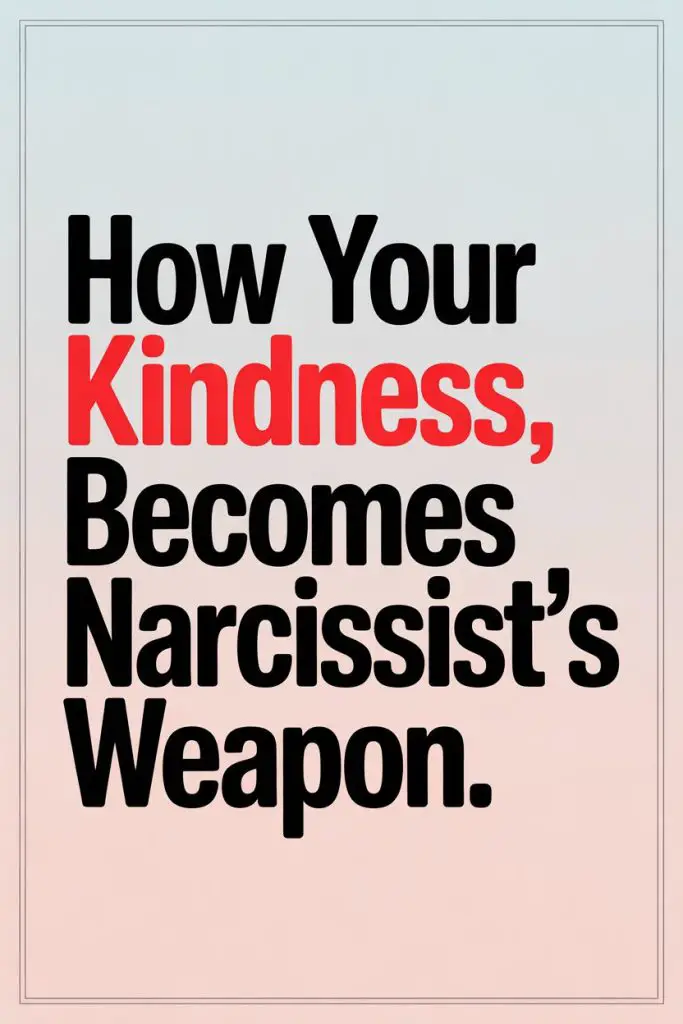Ever noticed how some people can turn your “good heart” into their own personal superpower? If it feels like your empathy is a magnet for emotional pickpockets, you might be dealing with a narcissist.
Let’s get brutally honest about how your kindness is not just appreciated by narcissists—it’s ammunition.
The Narcissist’s Magnetism for Nice People
Ask anyone who’s ever dated, worked for, or tried to parent a narcissist: kindness draws them in like moths to a bonfire.
Your compassion, patience, and readiness to see the best in people are like a flashing neon sign that says, “Excellent supply here! Free refills!”
Narcissists aren’t looking for cold fish or people who can’t be bothered. Oh no—give them someone who gives the benefit of the doubt and they’ll work with that.
Your willingness to understand, to forgive, and to overlook occasional rudeness is exactly what sets the table for their favorite meal: your self-esteem.
Flattery, Love Bombs, and the Bait-and-Switch
If you ever felt like you were being swept off your feet, then left hanging in mid-air, congratulations: you’ve met the love bomb. Narcissists wield flattery like a pro chef brandishing a cleaver.
They shower you with praise, tell you you’re the only one who gets them, and dial your kindness up to eleven.
But then things shift. Suddenly, your ability to forgive becomes your obligation to tolerate. Your patience is no longer a virtue; it’s an expectation.
The compliments dry up, replaced by criticism so subtle you barely notice at first. Why? Because they know you’re hooked—and your kindness won’t let you walk away easily.
Guilt Trips: Frequent Flyer Miles Included
Ever found yourself apologizing for things you didn’t do? Or did you say sorry for simply being upset about something they did?
Welcome to Club Guilt Trip, where narcissists hand out frequent flyer miles for every moment you spend doubting your own feelings.
They’ll remind you how much you mean to them, how lost they’d be without you, how nobody else could “put up with” them. (Spoiler: nobody else wants to.)
Your empathy, which should be a two-way street, becomes a one-way ticket to self-doubt.
Playing the Victim Card
Narcissists love a good sob story. If you’re always ready to help, they won’t hesitate to play the victim.
Suddenly, they’re the ones who are hurt, misunderstood, or constantly targeted by the cruelty of the world—and you, with your trusty toolkit of compassion, rush in to save the day.
Here’s the twist: every time you rescue them, your kindness tells them they don’t need to change. They simply need to stay “wounded” for the attention to keep flowing.
Your nurturing instincts, ironically, make you a permanent cast member in their personal soap opera.
Shifting the Blame Like a Professional Dodgeball Player
Kindness is a wonderful thing—until it convinces you that every conflict is a misunderstanding and, naturally, you must be at fault. Narcissists excel at rewriting history to make problems your responsibility.
The fight was your fault because you “took it the wrong way.” The silent treatment is for your own good. The emotional cold front is punishment for not being as understanding as you should be.
Your willingness to see both sides—gosh, what a blessing for them!—means you’re constantly cleaning up messes you didn’t make.
Gaslighting: Redefining Reality One Gentle Nudge at a Time
Narcissists rarely shout you down. Instead, they nudge, nudge, nudge until you’re questioning your own memory. “I never said that,” they’ll insist. Or, “You’re so sensitive! That’s not what happened.”
Your kindness, your basic trust in people, makes you less likely to believe someone would lie to your face.
Trust is a beautiful thing in a healthy relationship. With a narcissist, it’s the very tool they use to paint you as crazy, forgetful, or too emotional. They know that if you’re always doubting yourself, they’ll never have to take responsibility.
Manipulating Boundaries With a Wink and a Smile
Boundaries? What boundaries? Narcissists see your emotional fences as little more than quaint garden decorations. Your tendency to bend the rules “just this once” quickly becomes “every single time.”
They’ll test your limits with requests for favors, time, money, or emotional labor. And when you finally say no, out comes the pout, the guilt, or the veiled threats: “I thought you cared about me.”
Your kindness, meant to foster connection, instead becomes a lever to pry open every boundary you try to set.
The “But You’re So Caring” Trap
This one is a classic. Whenever you try to voice your needs or draw a line, the narcissist reminds you—smiling sweetly—how much they value your caring nature.
“You’re the only person I can really talk to.” “I don’t know what I’d do without your support.”
Translation: Please keep sacrificing your time, energy, and sanity so I don’t have to grow up emotionally. If you push back, suddenly you’re the monster. Your kindness, instead of being celebrated, gets twisted into an obligation.
Triangulation: Recruiting Your Kindness as Backup
Ever notice how the narcissist suddenly brings a third party into every disagreement? “Even my mother thinks you’re overreacting.” Or, “All my friends say I’m lucky to have someone as patient as you.”
Triangulation is the art of using your kindness against you—by making you feel alone, ganged up on, or responsible for “keeping the peace.”
Your instinct to listen, negotiate, and understand different perspectives becomes a trap. You start doubting your judgment because, apparently, “everybody else” agrees with them. (News flash: “everybody else” is usually just their reflection in the mirror.)
When Kindness Turns to Resentment
Nothing sours a relationship faster than realizing your best qualities are being used to hold you hostage. Over time, the well of empathy runs dry.
Instead of feeling generous, you’re left feeling exhausted, unappreciated, and maybe just a teeny bit vengeful (not that you’d ever admit it).
Resentment creeps in because giving stops feeling voluntary—it becomes survival. The narcissist isn’t there to reciprocate or appreciate. They’re there to consume, and the more you give, the thirstier they get.
Practical Shifts for Empaths Who’ve Had Enough
Here’s the good news: your kindness isn’t the problem—where it lands is. If your empathy is being weaponized, it’s time to sharpen some new skills. Empathy without boundaries is just self-sacrifice in a nicer outfit.
Start small. Practicing a simple “no” (without three paragraphs of explanation) can be a game-changer. If guilt trips start, mentally picture a customs agent stamping “DENIED” on their bags.
Document conversations and check your reality with trusted friends. When someone tries to gaslight you, having receipts—metaphorical or literal—can stop you from spiraling.
Make a list of your own needs and put them somewhere visible, even if your narcissist thinks self-care is a fad. You’re not selfish; you’re human.
Revisit your boundaries. If they were drawn in sand, consider concrete. People who value your kindness will respect your limits. Anyone who doesn’t—well, that tells you everything you need to know.
Reclaiming Your Kindness for Yourself
Handing your compassion to a narcissist is like giving a toddler a box of matches—no good comes from it, but the chaos is impressive. The real trick is learning to walk that tightrope between empathy and enabling.
You’re not required to save anyone who refuses to help themselves. Let your kindness be a gift, not a leash.
The right people will cherish it. The wrong ones will find someone else’s pantry to raid.
Kindness is your superpower. Use it wisely—and never let anyone convince you otherwise.


